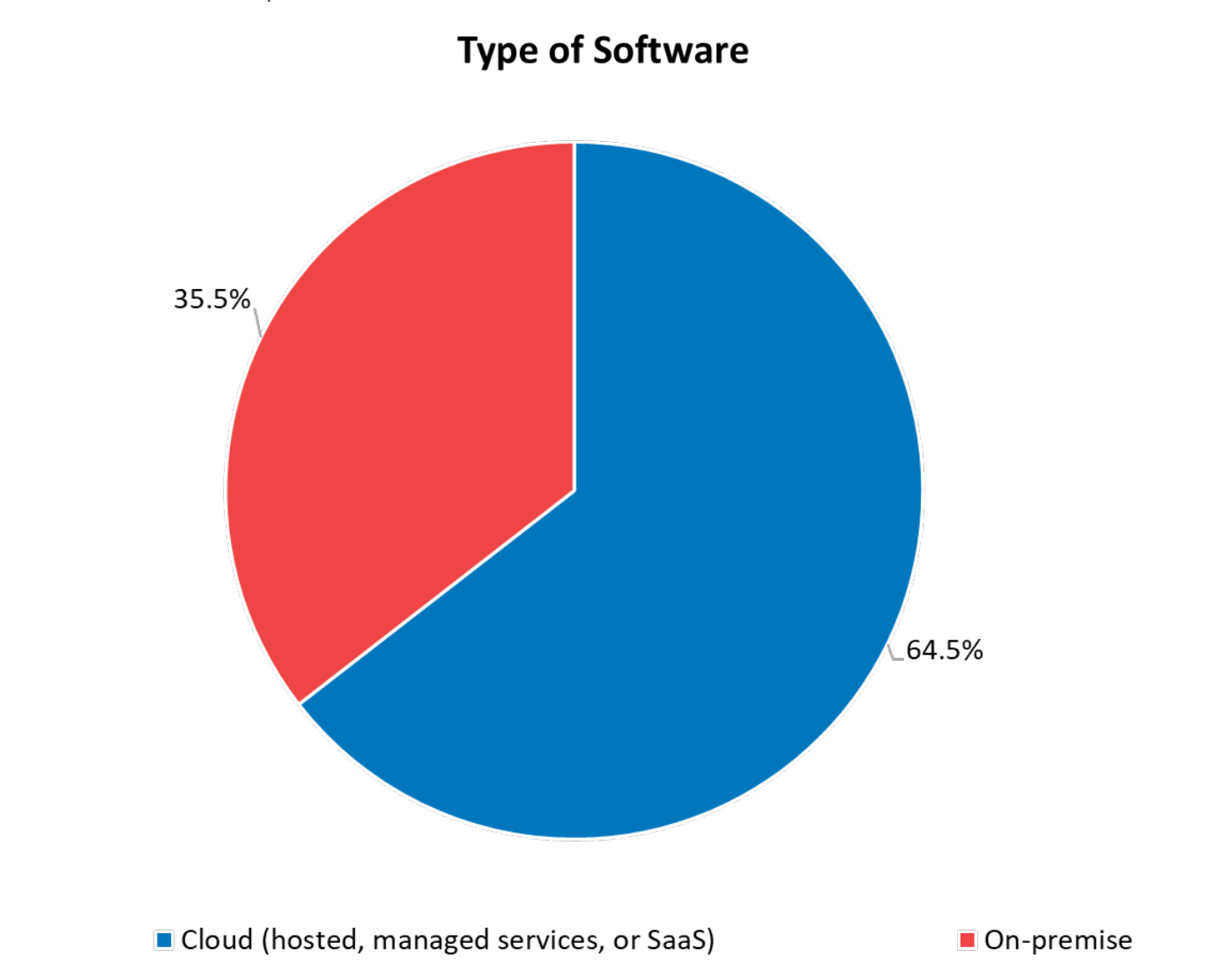
Businesses tend to stick with their basic enterprise resource planning (ERP) or legacy solutions until it’s necessary to make a change. But with the rapid development of technology, maintaining a competitive advantage means keeping up with the latest trends.
Modern ERP systems provide a means for businesses to differentiate themselves while also improving efficiency and sustainability. As new developments emerge, it’s essential for you to stay updated on what’s possible to take your business to the next level.
In this article, we’ll delve into the top trends shaping the future of ERP, ranging from cloud-based solutions and AI to integrating emerging technologies like IoT, two-tier, and mobile accessibility.
What is the current state of ERP?
Just as companies must change to meet today’s challenges, software vendors must evolve to incorporate future trends and meet their customers’ needs.
Today, and in the coming years, users will interact with ERP in entirely new ways. They’ll use “intelligent systems” to improve critical business processes and efficiency.
Overall, ERP will develop and shift to incorporate advanced technologies and meet industry standards. Since the market constantly changes, industry leaders must monitor trends and product offerings.
Let’s dive into the top ERP trends.
10 trends shaping the future of ERP
Modern ERP solutions have evolved to transform core business processes and improve legacy technology. These market trends are set to drive innovation and unlock new avenues of growth for businesses.

In this section, we’ll explore these trends and their role in the future of the modern ERP ecosystem.
1. Cloud-based ERP solutions
The global cloud ERP market is projected to reach $130 billion by 2027, thanks to the increasing adoption of cloud technology.
We’ll likely see businesses increase their investment in cloud offerings, which often feature the latest technological innovations. One advantage of cloud-based ERP systems is that companies require low upfront investments and can rapidly deploy their solutions.
As such, cloud solutions will deliver many benefits for businesses, including reducing their total cost of ownership and support costs through the subscription pricing model. Cloud-based ERP systems also leverage cutting-edge technologies like AI, big data, and machine learning.
With the numerous benefits that cloud-based ERP solutions offer, more businesses will likely shift to cloud solutions. This trend is clearly evident as 65% of ERP vendors have increased their focus on cloud and Software-as-a-Service (SaaS) solutions.
However, successfully migrating to a cloud ERP solution requires proper planning and assistance from an implementation partner. With a third-party support provider like Spinnaker Support, you’ll get exceptional assistance from experienced engineers, all while prioritizing cost reduction.
If you aren’t ready to move yet, Spinnaker Support can help you get the most out of your current on-premise solution — as we did for British-based Genus plc. We provided Genus plc with cost-effective and improved E-Business Suite (EBS) support as they prepared for an ERP migration.
2. Hyperautomation with AI and machine learning
ERP systems’ built-in AI and machine learning capabilities aid in improving core business functions and cater to the rising demand for customization. In fact, 52.8% of organizations report deploying AI to improve their ERP systems.
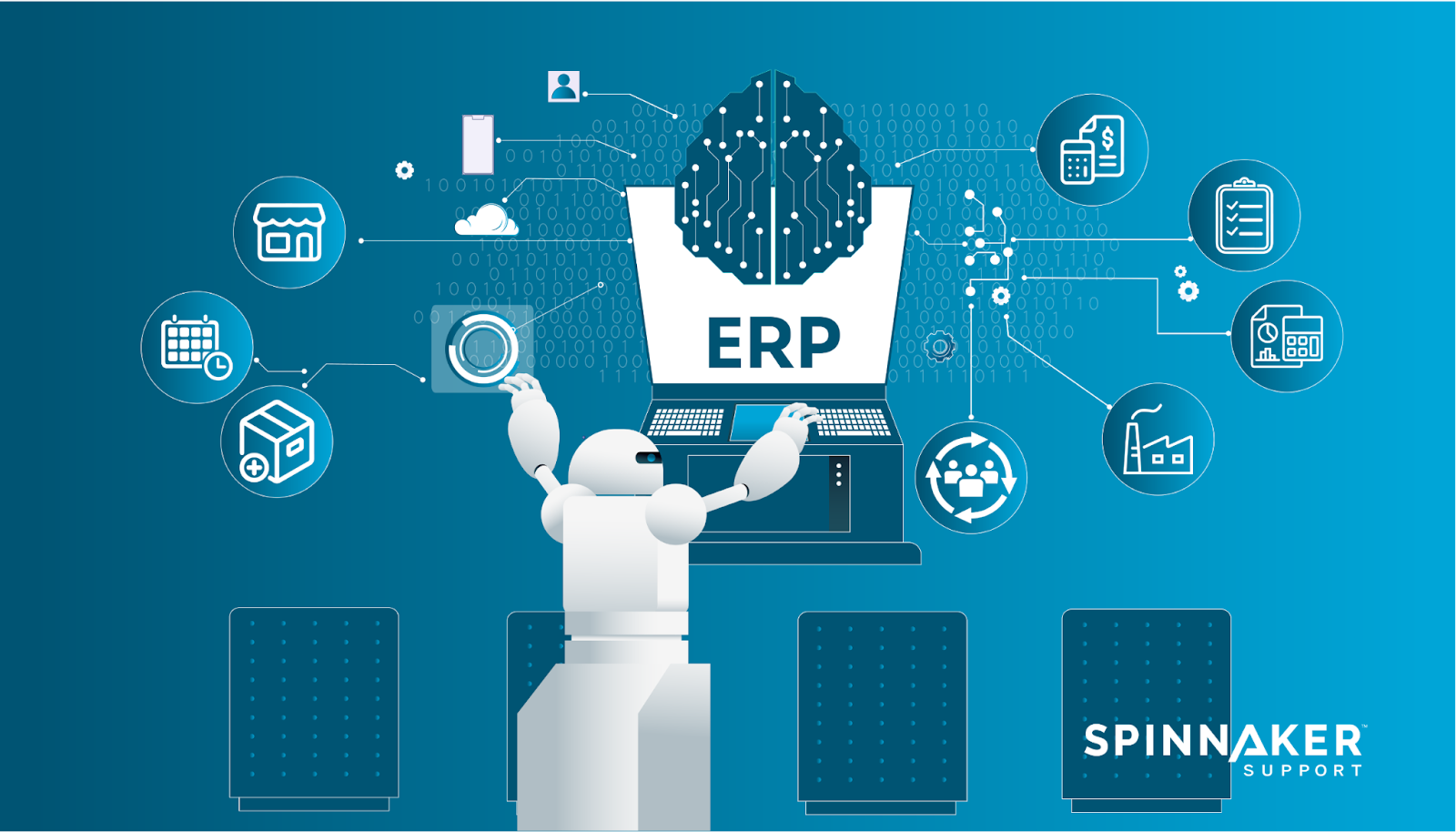
There are many ways in which AI can help businesses gain a competitive advantage. AI streamlines business operations and improves decision-making by analyzing data from various ERP modules to draw actionable insights.
Additionally, AI simplifies the workflow in ERP systems. For example, during ERP implementation, change management and user adoption rates often vary depending on the system’s complexity. Incorporating AI in ERP solutions enhances employee experiences by reducing the complexity of the software suite.
We can expect that more companies will continue to automate business processes for improved performance. In 2020, the global hyperautomation market was worth $581 million. By 2028, that number is expected to increase to $2.2 billion, an annual growth rate of 18.25%.
Hyperautomation will translate to more ERP solutions. It uses AI, robotic process automation (RPA), machine learning, and no-code and low-code platforms to automate business processes.
By integrating actionable data, hyperautomation will help you save money by improving your internal processes. Moreover, you’ll achieve operational excellence and streamline processes to run at peak efficiency.
Businesses will also see increased revenue and better insights and forecasts from monitoring and analyzing newly automated tasks. Ultimately, hyperautomation will allow you to automate redundant manual tasks and empower your staff to do more.
3. IoT and ERP convergence
The IoT revolution is reshaping the ERP industry by presenting innovative opportunities to improve operational efficiency. Its growing popularity is clear, with its global market projected to grow from $662 billion in 2023 to over $3.3 trillion by 2030.
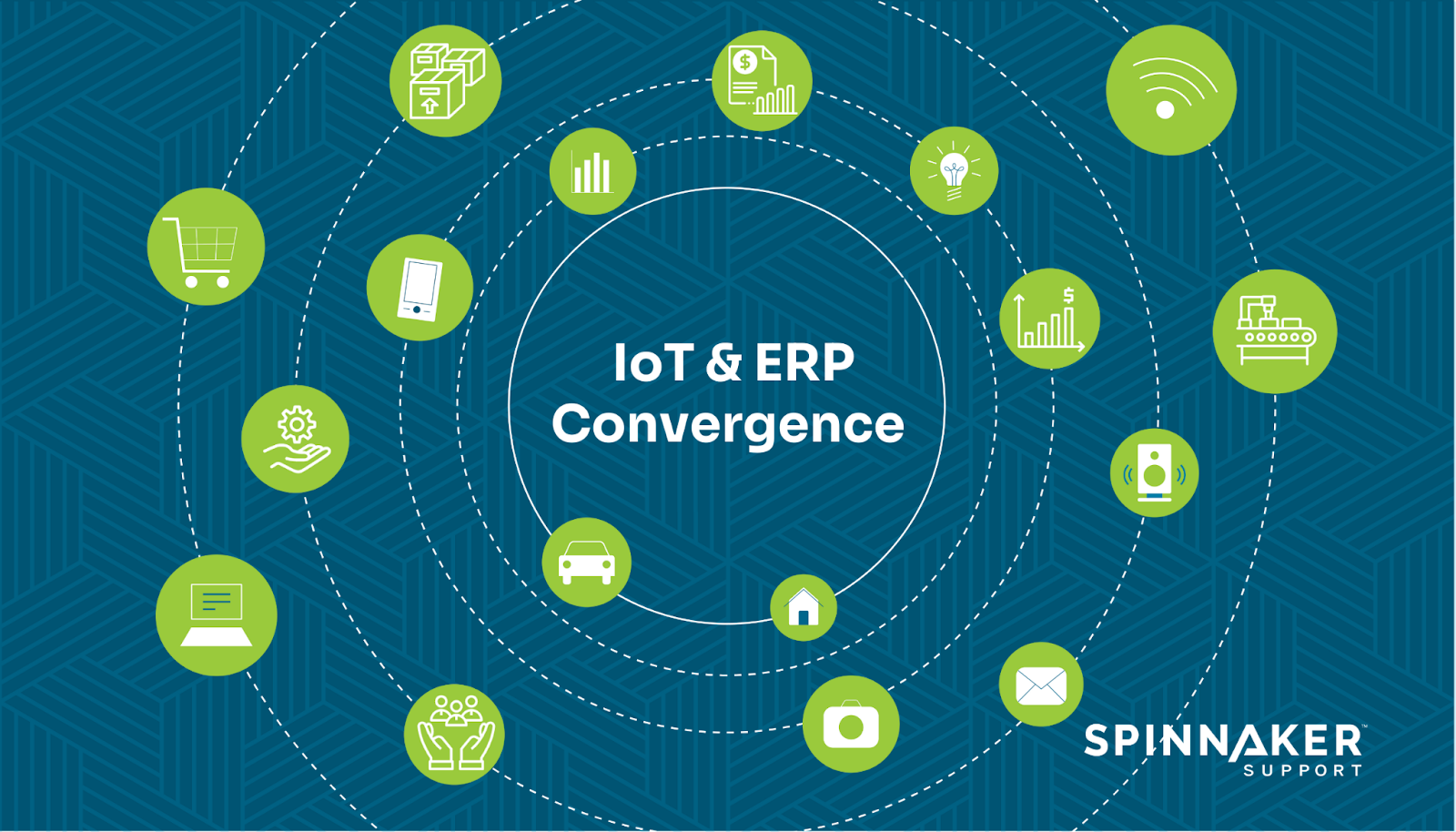
We can anticipate that IoT integrations in ERP will improve asset management, forecasting, business intelligence, and efficiency. For example, IoT sensors will track how equipment and machines are used, how well they work, and what maintenance they need. Additionally, IoT sensors attached to shipments will be able to track cargo’s location and status.
The quality and quantity of data IoT devices collect are crucial to improving your current business strategy. By combining ERP and IoT, we’ll see businesses boost the reliability and accessibility of their data, allowing them to respond to shifts in asset health and utilization instantly.
4. Mobile ERP accessibility
Businesses are increasingly adopting mobile ERP to gain a competitive edge. Mobile ERP connects employees and critical workflows in an organization, regardless of their location status.
However, mobile apps tend to have limited features and functionalities compared to their desktop counterparts. We can anticipate that future mobile ERP systems will address these shortcomings. We’ll see more intuitive and accessible user interfaces that are easy to use and customize.
Additionally, given the sensitive nature of the business information handled by ERP systems, security in the mobile apps will become a priority. We’ll likely see businesses put more money into advanced security features like encryption and secure network connectivity.
Overall, businesses will continue to reap the benefits of improved business cycle times and transaction lead times through mobility.
5. Industry-specific customizations
The adoption of industry-specific ERP software by businesses is also a growing trend. Specialized solutions offer comprehensive features unique to their target industries in a “plug-and-play” format.
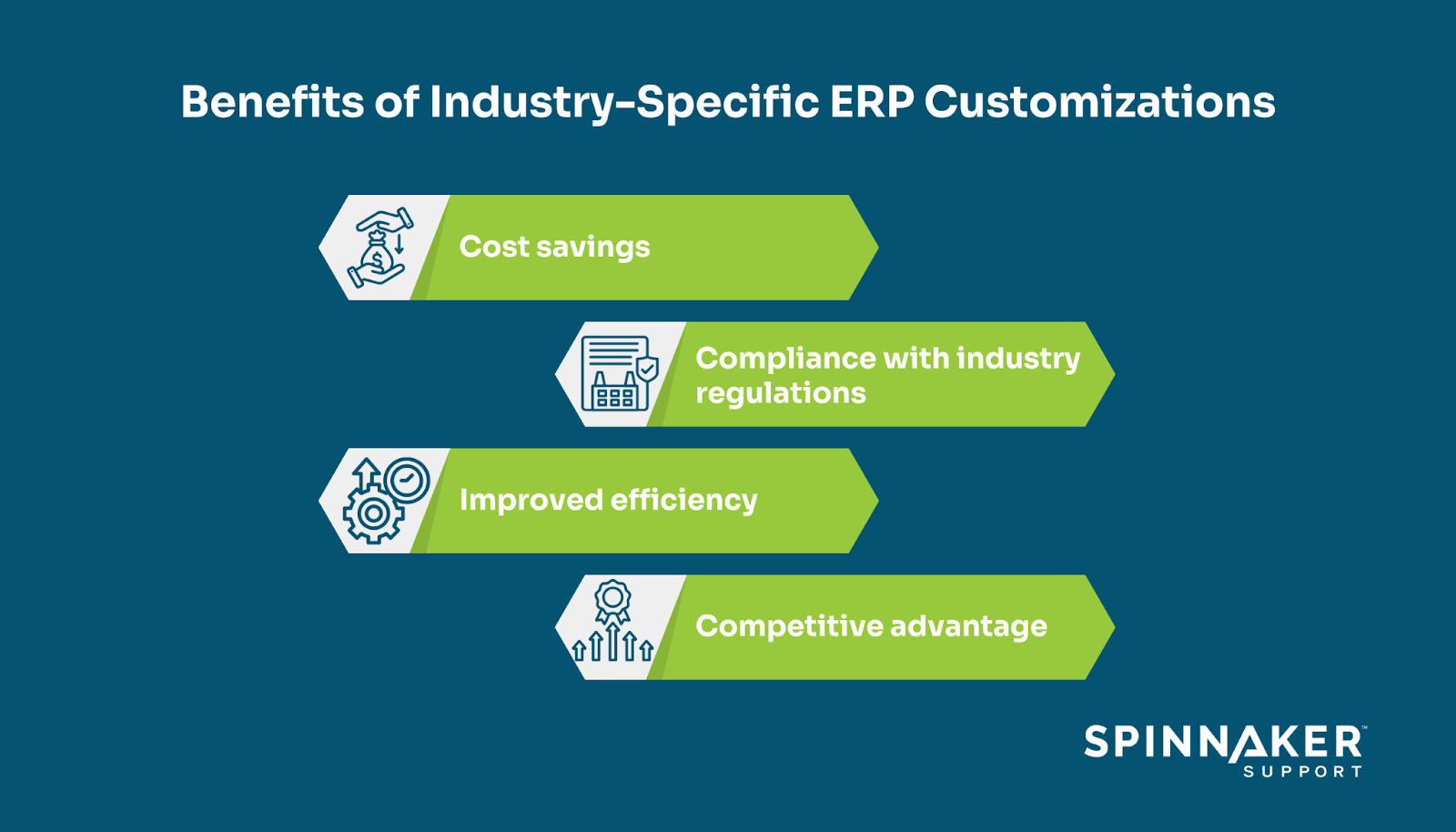
Vendors of industry-specific ERP typically know all the ins and outs of that industry and what’s needed to streamline business operations.
We can expect that most specialized ERP software will include the same core accounting, financial, and business management tools that are available in more general ERP systems. However, the differentiating factor will be the additional functionalities tailor-made to suit specific industry processes. For example, Microsoft Dynamics 365 Retail offers tools to help retailers manage inventory, keep track of sales, and manage customer relationships across all channels.
Companies that want to stick with well-known ERP vendors in the industry can still opt to customize their solutions. Although customizations tend to be costly and complex, working with a third-party support provider like Spinnaker Support can help you leverage cost-effective customizations and support services.
For instance, a large European retailer wanted to fix a functionality gap within their legacy Oracle E-Business Suite (EBS) system. With Spinnaker Support, they got customizations to improve the interoperability issues between their legacy Oracle EBS system and their SSO protocol — all within the bounds of third-party support.
6. Personalized and collaborative ERP
Traditional ERP systems often require employees to constantly jump between communication and collaboration apps like Slack, Zoom, and Microsoft Teams. We can expect to see modern ERPs leverage collaborative and personalization features to improve user experiences.
For instance, SAP and Microsoft have collaborated on new integrations between Microsoft Teams and SAP solutions like SAP S/4HANA, SAP Customer Experience, and SAP SuccessFactors. The integration between SAP and Microsoft Teams will make teamwork much simpler for SAP users.
Additionally, ERP systems will likely have more role-based customizations. Whether it’s low code or no code, ERP users can tailor their systems to their specific needs, allowing them to adopt more streamlined practices.
Also, we can expect ERP providers to provide more native integrations and simpler ways for users to personalize and customize them to fit their workflow. Overall, collaboration and personalization will increase employee productivity and engagement, fostering organizational innovation and efficiency.
7. Predictive and advanced analytics
Modern ERP solutions with big data and analytics have helped businesses prioritize and reap the benefits of data-driven decision-making. It’s no surprise that from an estimated $241 billion in 2021, the big data and analytics market is projected to grow to more than $655 billion by 2029.
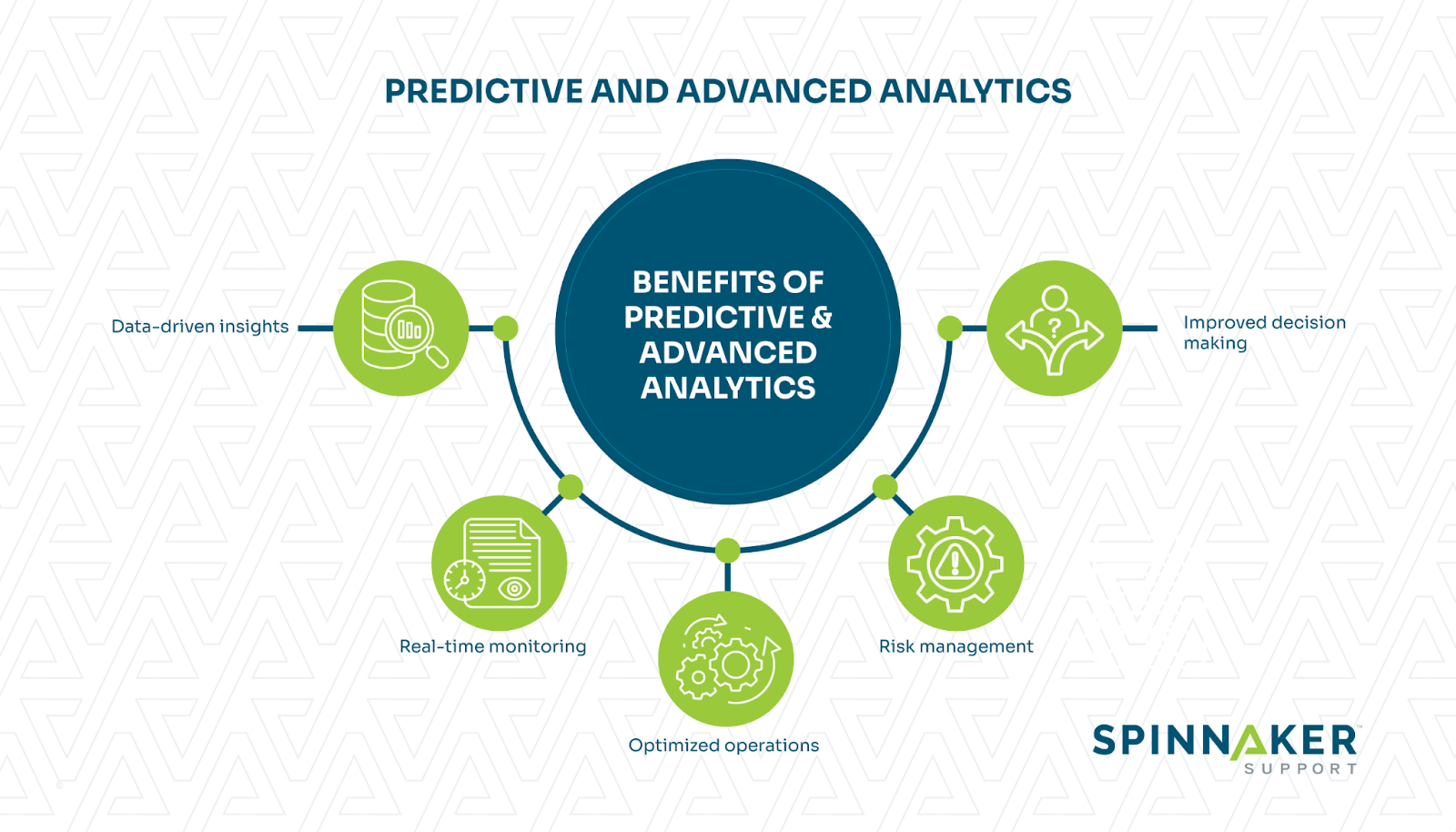
We’ll likely see data analytics features such as ad hoc reporting, integrated analytics, and data visualization become standard in most modern ERP systems. Businesses will benefit from advanced analytics through real-time monitoring, better demand forecasting, and improved decision-making through data-driven insights.
What’s more, advanced analytics will help businesses optimize their operations by flagging anomalies and sending alerts to relevant stakeholders. The future of ERP also includes using predictive analytics to determine how likely future events are to happen based on historical data.
Today’s ERPs offer predictive analytics for a wide range of uses, such as:
- Demand forecasting
- Predicting maintenance needs for equipment and vehicles
- Production and machine simulation using digital twin technologies
- Supply chain management
Future versions of ERP predictive analytics will likely incorporate advanced machine learning algorithms to better analyze historical data and predict future industry trends and events. We can also anticipate the adoption of real-time predictive insights, which lets businesses use real-time data to respond faster to market changes.
Undoubtedly, predictive analytics will help businesses improve their products, respond to shifting consumer demands, and reduce operational expenses.
8. Two-tier ERP
Two-tier ERP is a model in which larger companies use two interoperable solutions simultaneously. This feature is most suitable for companies with subsidiaries or multiple locations. For example, companies can keep their current on-premises ERP solution for core processes and integrate tier 2 solutions for their specialized needs in other divisions.
We can expect to see improved localization features that better meet the complex regulatory and compliance needs of different regions. Additionally, we’ll see better analytical capabilities that will help organizations gain relevant insights from two-tier ERP systems.
The two-tier ERP trend will offer value to companies struggling with a one-size-fits-all approach and needing more flexible and specialized ERP solutions. Additionally, it’s a more cost-effective option than overhauling your entire ERP system. It’s simpler to implement and more adaptable to changing business needs.
If you want to maintain your current ERP solution and take advantage of two-tier ERP, you can do so with a third-party support provider like Spinnaker Support.
9. Composable ERP
The concept of composable ERP allows for the creation, modification, and extension of ERP systems to meet dynamic needs. A composable ERP enables organizations to respond more quickly to changes in the business environment.
For example, you can use APIs, third-party apps, cloud connectors, and enterprise technology platforms to integrate and add new solutions to your ERP solution.
With composable ERP, we can look forward to more robust and trouble-free integrations with third-party apps and IoT gadgets. Besides, vendors of composable ERP systems will likely deliver more industry-specific modules.
10. ERP and sustainability
Whether it’s meeting internal goals, satisfying customer demands, or complying with regulations, sustainability has become a top priority for businesses. In fact, CEOs rated sustainability as their top priority in 2022, 37% more than the previous year.
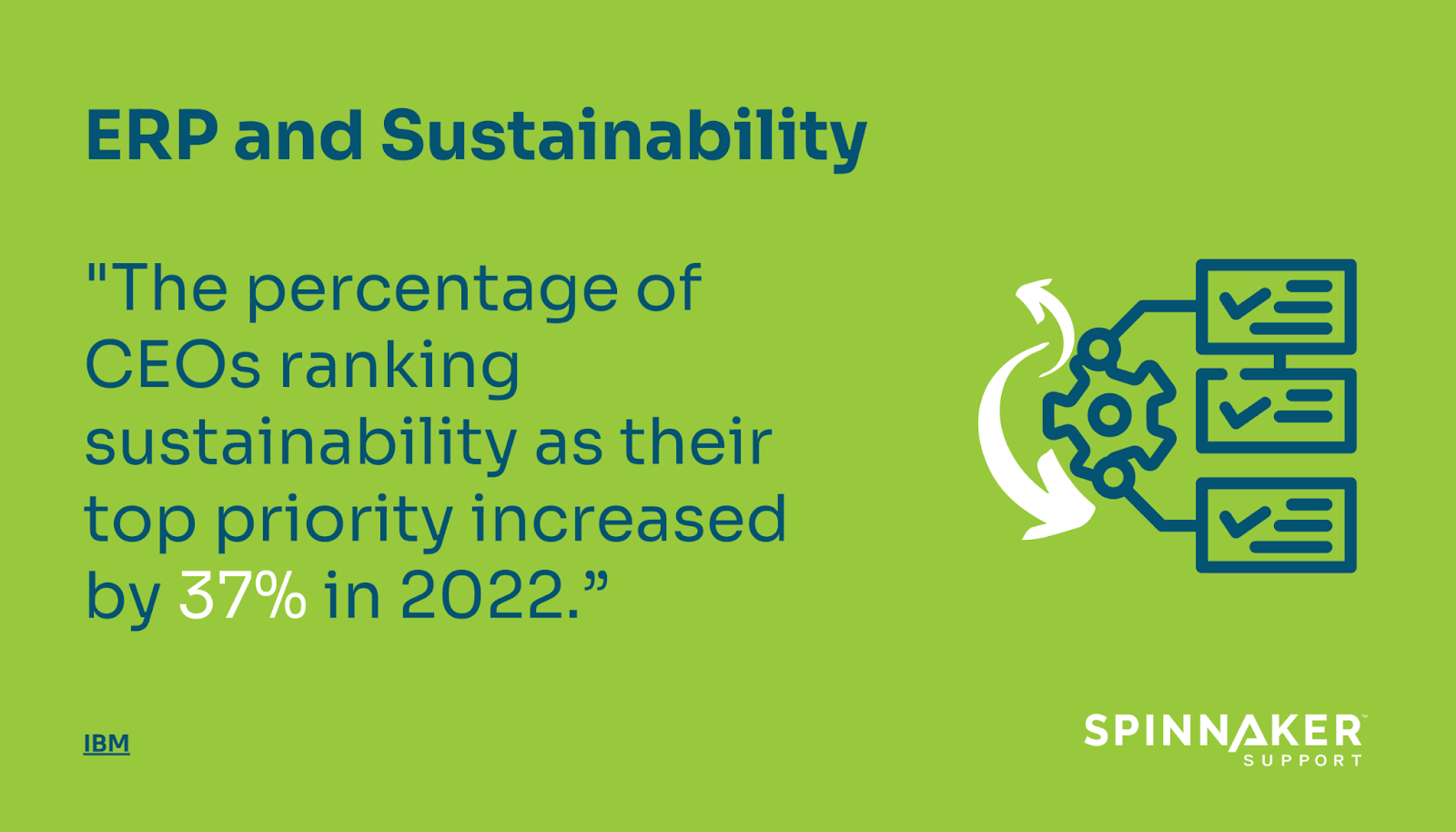
By the year 2026, all businesses, regardless of size, must comply with the Corporate Sustainability Reporting Directive (CSRD) of the European Union and prepare sustainability reports as per the European Sustainability Reporting Standards (ESRS).
This means going forward, laws like this will likely influence ERP systems incorporating a ‘green line’ to determine the ecological impact of any business endeavor.
Leveraging future ERP trends with third-party support
The digital revolution has contributed to exciting opportunities and complexity in the modern ERP landscape. With so many options available today, choosing an ERP system requires an in-depth analysis of its core features for informed decision-making.
The future of ERP looks transformative as the trends listed above reshape how businesses function. So, if you want to migrate your ERP system to take advantage of these trends, third-party support can help you.
With Spinnaker Support, you’ll get the assistance you need when implementing a new ERP system. If you want to maintain your current ERP solution, you’ll get cost-effective support options from experienced engineers. Take the step today and contact Spinnaker Support.
